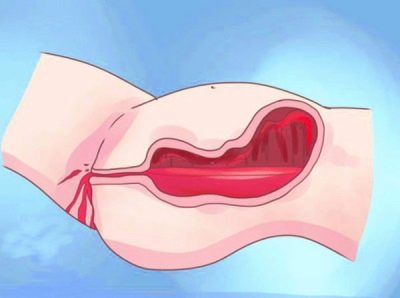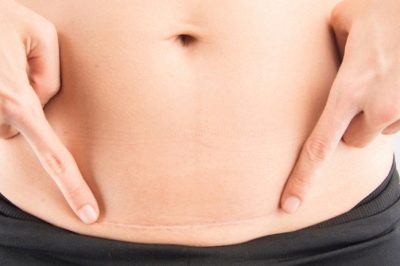Features of menstruation after cesarean section
Monthly after a cesarean section, sometimes you have to wait quite a long time. Restoration of the female cycle is a very delicate and delicate process, which depends on a large number of factors. In this article we will look at the main features of menstruation after surgical labor, and also describe how much time is needed for the full recovery of the menstrual cycle.
Postpartum discharge
Many people mistakenly believe that menstruation begins immediately, as the delivery operation was performed. Indeed, a woman has abundant blood discharge from the genitals. But this is not menstruation, but lochia. That is how in medicine it is accepted to call postpartum discharge, which neither in composition nor in its root cause with menses have anything in common.
In the menstrual fluid is not only the blood that appears when the detachment of the endometrium. In the second half of the female cycle, the functional layer of the uterus under the action of progesterone expands, and if pregnancy does not occur, it must be rejected to begin a new cycle. In the menstrual flow there are enzymes, cervical mucus, intrauterine fluid.
Discharge after cesarean section and after vaginal delivery is 99% composed of blood. Lochia is blood from the placental wound. When carrying out operative labor, doctors remove not only the baby from the uterus, but also disconnect the “baby’s seat” from the uterine wall. The pregnancy is over, the placenta is no longer needed. The temporary body fed and protected the baby during pregnancy, but with its ending it becomes superfluous.
During childbearing, the vessels of the placenta are tightly intertwined with the vessels of the uterus wall, practically growing into them. Therefore, the detachment of the "childish place" leads to the formation of bleeding. The uterus, which has undergone surgery, is also bleeding in the area of the wound and the internal sutures placed on it.
Lochia usually takes about 8 weeks. On the first day of discharge, liquid and strong, blood. The next day begins the gradual process of the formation of fibrin filaments, which "tightens" wounds and prevents blood loss. Discharges acquire a distinctive feature - the blood is mixed with clots.
The uterus is gradually reduced, there is a process of its reverse development. After surgery, women are given cutting drugs to make this process more effective. After the injection, the discharge is intensified, there may be quite noticeable nagging pain in the lower back and lower abdomen. Already on the sixth day in the discharge appears serous fluid, ichor. And a week later - mucus. The second month after the operation, the lochia is more scarce, yellowish, gradually giving way to pure mucus and normal secretions.
Monthly after cesarean section come after cleaning the uterus from lochia after some time, which depends on many factors - the characteristics of the recovery period, possible complications, breastfeeding, age and well-being of the woman. The first periods on lochia are not very similar. And their main feature is remoteness in time.The female body needs time, at least a few weeks to restore the function of the ovaries, and therefore, after lohii, there can be no menstruation after a few days.
The first menstruation will be different from the usual before pregnancy. There will be less excretion since the endometrium is still thin, and the woman’s body has not fully recovered physiologically. The duration of the first menstruation may be shorter. If a woman has always had monthly periods of 5-6 days, then the first periods after the operation of delivery can last 3 days.
Restoring previous criteria - length, regularity, abundance, etc., will require several new cycles.
When do menstruations begin?
The timing of the onset of menstruation after operative delivery depends on the rate of change in the hormonal background of the woman. During pregnancy, progesterone was the main hormone in the female body. After the cesarean section is done, its concentration decreases, but the amount of oxytocin and prolactin increases. Oxytocin helps to reduce the uterus to normal size, and prolactin is involved in the production of breast milk so that the newly-made mother will be able to feed her baby.
Hormonal "scrape" can last for quite some time. But as soon as the female body produces a sufficient amount and the correct ratio of progesterone, estrogen, luteinizing hormone, follicle-stimulating hormone, the ovaries will begin to work, the egg will ripen first after a long break, and two months later will begin.
If the baby is bottle-fed since birth, prolactin, which suppresses the formation of progesterone, is not enough. Accordingly, the female monthly regular cycle is restored within 1-2 months after surgery. With breastfeeding, menstruation will go much later. If a woman is breastfeeding, prolactin forms a lot, it inhibits ovarian function. When breastfeeding is constant, abundant, the baby eats on demand, there is no menstruation. The delay will be completely justified and normal, it should not cause concern.
When the baby is 6-7 months old, the woman, on the recommendation of the pediatric doctor, introduces complementary foods. The amount of breast milk consumed by the child decreases, its production naturally slows down somewhat, prolactin begins to fall in the blood, and progesterone increases. Usually 2 months after the introduction of complementary foods to the baby’s diet, the menstrual cycle should recover. If the baby is on a mixed ration, the mother combines the mixture and breast milk, her period will come earlier, and they can begin after three or four months after the operation.
What else can affect the onset of menstruation? A large number of different things. For faster recovery of the female cycle need to remain calm. If a woman is depressed, she is depressed, worries, does not get enough sleep and is already completely exhausted, then you should not count on the onset of menses. The age of the newly made mother is important. The younger the woman, the faster the female cycle can recover from her surgery. After 35 years, this process often lasts longer.
The presence in the diet of women nutrition, large amounts of protein foods and vitamins have a positive effect on the timing of recovery of the sex glands. A diet, hypovitaminosis, smoking and alcohol can, on the contrary, postpone the onset of menstruation. Plays a role and how the postoperative period proceeded. If there were no complications, menstruation may begin earlier. If a woman was forced to take antibiotics, hormonal drugs, took other medications of systemic action, normalization of the menstrual cycle may go slower, and the periods themselves may be painful and irregular for longer.
When do you need help from a doctor?
If the child is an artificial artist, and there are no monthly for half a year, the woman should consult a doctor. When breastfeeding with timely feeding of the child to the doctor you need to ask for help if there are no periods for a year or more. Irregular periods during the first few months should not cause concern. It takes time for the women's cycle to start working like a clock again after suffering stress.
If irregular menstruation continues for six months or more, you should definitely consult with the gynecologist to determine the causes of dysfunction. More painful than before pregnancy, menstruation, which occur with fever, vomiting, severe pain, are also grounds for a visit to the doctor. Foamy discharge, bad-smelling, heterogeneous, too scanty or too abundant should also alert the newly made mother and make her visit the antenatal clinic.
Is it possible to get pregnant if you delay the monthly?
Very often, women believe that while breastfeeding, they can not get pregnant. This error is costly to many. It is absolutely impossible to understand and notice the moment when prolactin starts to decline, on the physical level, there is no way to determine this moment. That is why a woman can not even guess that the maturation of a new egg has already begun in her ovaries, and pregnancy can occur even before the first periods after the operation begin.
Therefore, after the end of lochia (approximately 2 months after surgery), it is imperative to use a condom until regular menstruation begins. After that, the woman can choose another method of protection from unplanned pregnancy in consultation with the gynecologist, who she visits. Pregnancy again after surgical delivery is not recommended for at least 2 years. Abortion is also contraindicated if a woman plans to carry out and have another child in the future.
Any manipulation of the uterus can have a deplorable effect on the condition of the incompletely formed internal scar after cesarean section, which creates additional threats during the subsequent, desired pregnancy. Failure to comply with this recommendation is fraught with the formation of an insolvent scar, which will complicate the carrying of the next child. Pregnancy can occur on the background of the threat of miscarriage, impairment of uteroplacental and fetoplacental blood flow, the baby may develop with delay.
To give birth on your own if there is only 1 cesarean section with an insolvent scar in history. In the first two months, intimate relationships are generally contraindicated - internal scars take time to form. During this time there should be no risk of damage to the sutures on the uterus, as well as any infections through the genital tract.
What to do to help the cycle recover?
To help restore women's health after a cesarean section, a woman should not lift heavy objects. Weight limit - no more than 4 kilograms. You can not make sudden movements, jump, fall. Medical recommendations state that it is important for a woman to eat correctly and fully, not to allow strict diets, not to be nervous, not to bring herself to exhaustion.
About the features of menstruation after cesarean section, see the following video.























